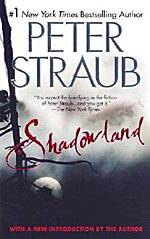
![]() verkisto
verkisto
7/26/2016
![]()
Shadowland was the third in the books I enjoyed so much as a kid, but when I read as an adult, I realized that this book wasn't ever really about looking back on the idylls of youth. In fact, there wasn't even much of a pretense of putting anything idyllic in this novel at all. The only redeeming quality about childhood from the book was the wide-eyed innocence of Del (which was destroyed by the climactic scene in the novel), and the friendship between him and Tom (which was barely a friendship at all, and more of a dependent relationship on Del's part). But the magic, the imagery, and the overall premise of the novel had a profound effect on me back in high school. Amazingly, it held up well over the past 20-ish years, but I think I appreciate it now for different reasons.
The entire novel is about the two main characters -- Del Nightingale and Tom Flanagan -- who are both amateur magicians, and who spend one summer with Del's uncle, who is a famous and very eccentric magician. The plot starts at their boarding school, which seems like something straight out of David Copperfield, and the horrible things that happened to both characters. From there, it shifts to Del's uncle's estate -- Shadowland -- but what they realize when they get there is that the boarding school had been a part of Shadowland that year, too, and that all of the horrible events were all about Coleman, Del's uncle, wanting to bring them both to his side of magic. Real magic.
In the first half of the novel, set at the boarding school, a lot of attention is paid to an English course where the instructor is fascinated with fairy tales. The fairy tales are actually the core of the theme of the book, as Straub takes a handful of fairy tales and weaves them together to form the backdrop of the plot. It explains a lot about the tone of the novel -- it's very dark and bleak, with an ending that can hardly be classified as "happy" -- but it gives the story a nice depth that I hadn't recognized before. I'd like to say that I would have figured this out without having to read about it Straub's new introduction to the latest printing of the book, but who knows? I read it first, and then I started looking for those points.
I remember being fascinated with the character of Rose Armstrong, a live-in helper at Shadowland who is about the same age as Tom and Del, when I was younger, and I still found her to be a fascinating character, though for different reasons. She becomes involved with Tom, all while Del thinks she's still agog over him, and their three-way relationship takes on a life of its own once all three of them meet. But this time I noticed more how much of a tortured character she was, and understood more the mystery of her origins. Her foolishness and naivete grew a little tiresome, but understanding what her origins were, and what drove her motivations, explained away a lot of her strange behavior. But she still had an odd attraction that went further than her relationship with Tom and Del, and she's a character that lingers long after you finish the book.
I don't think the book is perfect -- there was at least one major plot point that I felt needed to be explained away to really buy the entire story -- but it's still a damn fine book by a damn fine writer. I find it very curious that, during this period of reminiscence, Simmons' book improved, King's slid back a bit, and Straub's stayed about the same, but for different reasons. I hesitate to call it maturity that's affected how I view the novels, but it has been about 20 years since I read some of these books, and I suppose I did have to grow up some in that span of time. I highly recommend this novel to any fans of horror, dark fantasy, or even urban fantasy.